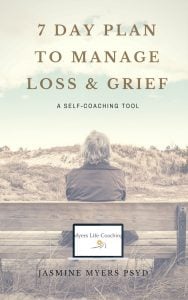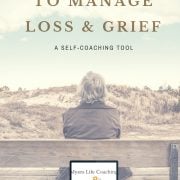Stifled Grief: A 7 Day Plan to Manage Loss and Grief

7 DAY PLAN TO MANAGE LOSS & GRIEF
Stifled Grief: A Coaching Tool To Help You Manage Your Loss
Grief is simply the experience of a loss. I can honestly say I have had the experience of losing my father, mother, nine year old cousin, aunt, great aunt, and grandfather. These people were very close to me. Each one of them played a major part in making me who I am. Every time I see the passing of a Toyota 4 runner, I can smell and hear my aunt. When I look into the eyes of my son, I see my mother’s smile. Just the other day I went into a Foot Locker and seen the Space Jam Jordan’s and thought of the countless times I was forced to watch the Space Jam Movie with my cousin. I did not realize how special each one of those moments truly were. Certain pictures, meals, smells and experiences drudge up their memory.
This post presents life coaching tools and exercises in the free download. Loss can come in many different forms. Loss of a job, health, pet, business failure, physical image, a breakup/divorce, relocation and even major competition can cause us to grieve. The death of someone you love is one of the greatest losses that can occur. Grief is a normal, healthy response to loss.
Everyone feels grief in their own way, but there are certain stages to the process of mourning. It starts with recognizing a loss and continues until a person eventually accepts that loss. Accepting the loss does not mean that you get over the loss. It simply means that you accept who you are without that person or circumstance. People’s responses to grief will vary depending upon the circumstances of the death. For example, if the person who died had a chronic illness, the death may have been expected. The end of the person’s suffering might even have come as a relief. If the death was accidental or violent, coming to a stage of acceptance could take longer.
The common factor in all these events is change. Change, even positive change, equates to loss, and any loss requires an adjustment – this adjustment process is felt as grief. An awareness of the stages of grief can help us to deal with the feelings that inevitably accompany loss. If we are aware that what we are feeling is entirely normal and that there “is a rhyme and a reason, a time and a season” we are better placed to be able to accept and allow the process to work through us. It should also be borne in mind that we are all different, so some people experience the stages in varying orders, times or degrees of intensity. In her writings, Kubler-Ross (2005) described the five stages of grief.
The Five Stages are:
- Denial
- Anger
- Bargaining & Regret
- Sadness
- Acceptance
Denial
Denial is generally the first stage in the grief process. A part of us cannot accept that the change or loss has actually occurred. We may feel numb or experience shock. This is our emotions way of dealing with an unexpected and significant change. Have you ever heard someone that experienced a loss say that they feel “numb”. This is a feeling that may accompany denial.
Anger
The next stage is anger. We probably feel that the loss is unjustified, and ask “Why me?”
We feel angry that we have lost someone or something. Anger is a secondary emotion because we tend to resort to anger in order to protect ourselves from or cover up other vulnerable feelings. A primary feeling is what is felt immediately before we feel anger. We almost always feel something else first before we get angry. We might first feel afraid, attacked, offended, disrespected, forced, trapped, or pressured. If any of these feelings are intense enough, we think of the emotion as anger. Anger is like an iceberg in that only some of the emotions are visible. The other emotions exist “below the water line” where they are not immediately obvious to those around us.
Bargaining & Regret
In the bargaining stage, we are trying to come to terms with what has happened and may regret what we didn’t or could not do.We may regret that we didn’t spend more time with Gran while she was alive. Common thoughts include “If only … “I wish … “Maybe if ….”
Sadness
Feelings of sadness actually signal the end of the grieving process. Sadness is a very positive emotion, it means we are beginning to actually feel the loss and come to terms with it.
We start to feel profound sadness that Gran is gone.
We may wish to end this stage and to “move on” as quickly as possible, but at such times it is good to recall the medical maxim, “Patients need patience.”
Acceptance
The final stage in the first cycle of grief is acceptance, and represents that the healing is complete.
We are starting to incorporate into our life and our thinking, the knowledge that our Gran is gone and is not coming back.
Awareness of the stages of grief can help us to give ourselves permission to grieve and heal. It can also increase our emotional competence because we are better able to identify what we are feeling and why.
In addition to the above 5 Cycles of Grief there is also the phenomenon of Transference.
If we have not fully felt our loss, or if the loss is especially significant, we will probably experience some degree of transference. Transference means that when we grieve over one event, we are actually feeling the grief over something else. Meaning that you transfer all of those pent up emotions to another situation or event. For example, say your grandmother passed and you didn’t feel much emotion, but when our beloved cat unexpectedly dies we experience profound loss and feelings out of proportion to the event. Our culture teaches us to bottle everything up. We are to mask and stifle our pain and continue to grind and work. Do not stifle your grief process. It takes time, the process is not linear. You may cycle back into the anger, sadness or bargaining phases. Just be patient with yourself and know that eventually it will get a little easier.
We invite you to download our 7 day plan to manage grief and loss at http://griefcoachingtool.pagedemo.co/ The 5 stages of grief pdf is included in the download. These coaching resources and tools will help you think about the process of loss.
Life Coaching husband and wife team devoted to helping people build the skills necessary to overcome life stresses such as work conflict, jealousy, mis-trust, aggression and insecurities. Gain insight from both a minister & psychologist with over 22 years of education combined! Phone us at (228)-263-4723. You can now book your sessions right from our Facebook page, just click on the book now app or use the below link. http://my.setmore.com/bookingpage/9472ee36-f53f-499c-9bcd-7aa3f0547e60





Leave a Reply
Want to join the discussion?Feel free to contribute!